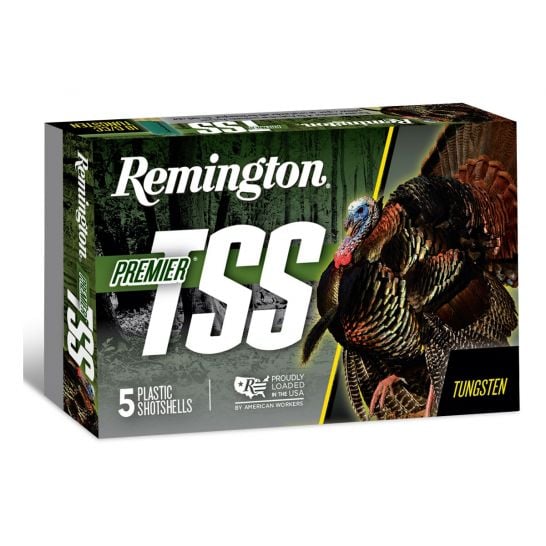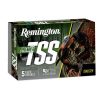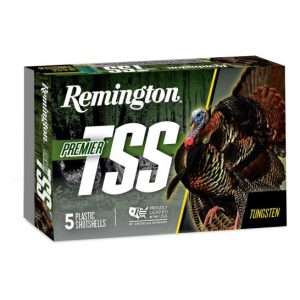Remington Premier TSS 20 Gauge 3" 1 1/2 oz 9 Shot 5 Rounds – TSS2039 For Sale
$52.99
The Remington Premier TSS 20 Gauge 3″ 1 1/2 oz 9 Shot 5 Rounds – TSS2039 is a premium turkey hunting ammunition that leverages advanced technology from the trusted Remington brand. Utilizing ultra high-density tungsten super shot, this ammo offers superior energy delivery and tighter shot patterns than traditional lead, ensuring maximum impact and effectiveness. The increased pellet count and precise targeting enhance the likelihood of successful hunting outcomes. Suitable for a variety of shotgun preferences, including the lighter 20 Gauge, this ammunition delivers exceptional performance for turkey hunters seeking reliability and effectiveness in the field.
Are TSS shells worth the money?
The worth of TSS (Tungsten Super Shot) shells largely depends on individual preferences and needs. TSS shells are generally more expensive than traditional lead or steel shots, but they offer several advantages:
1. **Increased Density:** TSS is denser than lead, allowing for smaller shot sizes that achieve similar or better penetration at longer ranges. This means you can shoot at targets from a greater distance with more lethality.
2. **Better Patterning:** The denser material often results in tighter shot patterns, which can enhance accuracy and increase the likelihood of successful hits.
3. **Versatility:** TSS is effective for hunting a variety of game, including waterfowl, turkey, and upland birds, making it a versatile choice.
However, the higher cost can be a significant factor. For some, especially those who hunt frequently or in competitive settings, the performance benefits may justify the price. For others, especially casual hunters or those on a budget, the cost might outweigh the advantages.
Ultimately, whether TSS shells are worth the money is subjective and depends on your specific hunting needs, budget, and how much you value increased performance and range.
Is TSS better than lead?
It seems like your question might be referring to TSS (Tungsten Super Shot) and lead in the context of ammunition, particularly for shotgun pellets. Here’s a brief comparison:
1. **Density and Performance**: TSS is denser than lead, meaning it can retain more energy and offer better penetration at longer distances. This can make TSS a better choice for hunting, where effective range and stopping power are critical.
2. **Environmental Impact**: Lead is toxic and poses environmental and health risks, causing harm to wildlife and ecosystems if spent pellets accumulate in nature. TSS, made from tungsten, is considered more environmentally friendly because it doesn’t have the same toxic effects as lead.
3. **Cost**: TSS is typically more expensive than lead. The higher cost can be a significant factor for many hunters when choosing ammunition.
4. **Regulations**: In some areas, the use of lead shot is restricted or banned, especially in wetlands and for hunting certain types of game. In such cases, TSS or other non-lead alternatives are necessary.
In summary, TSS can be considered “better” than lead in terms of performance and environmental impact, but it is also more costly. The choice between TSS and lead would depend on individual priorities, such as performance needs, environmental concerns, regulations, and budget.
Which is better, TSS 7 or 9?
The determination of whether TSS 7 or TSS 9 is better depends on the context in which they are being compared. TSS can refer to various things, from a Total Sum of Squares in statistics to Therapeutic Support Staff in health services, or specific models/products labeled as TSS. Please provide more specific information about what TSS 7 and TSS 9 refer to, including the criteria you are using to judge “better,” so I can offer a more relevant comparison.
What is the difference between TSS and tungsten?
TSS stands for Tungsten Super Shot, which is a type of shotgun ammunition known for its high density and excellent ballistic performance. It is made from tungsten alloy pellets, offering better penetration and longer range compared to traditional lead shots.
Tungsten, on the other hand, is a chemical element with the symbol W and atomic number 74. It is a dense metal known for its high melting point, strength, and hardness. Tungsten is used in a variety of applications, including light bulb filaments, industrial machinery, and aerospace components.
The primary difference between TSS and tungsten is that TSS refers to a specific application of tungsten in ammunition, whereas tungsten itself is the raw metal element used for various purposes beyond just ammunition.
Does TSS hurt your barrel?
Yes, TSS (Tungsten Super Shot) can potentially cause more wear on a shotgun barrel compared to traditional lead shot because of its hardness and density. However, most modern barrels are designed to handle steel and tungsten-based shots. It is important to ensure that your shotgun is rated for use with such ammunition and to follow the manufacturer’s recommendations to minimize any potential damage.
Is tungsten better than lead shot?
Tungsten shot is generally considered better than lead shot for several reasons:
1. **Density and Performance**: Tungsten is denser than lead, which means it can deliver similar or greater energy in a smaller size. This density results in better penetration and more effective shooting over longer ranges.
2. **Environmental Impact**: Lead is toxic to wildlife and can contaminate water supplies, leading to regulations and bans on its use in many areas. Tungsten is non-toxic, providing an environmentally friendlier alternative.
3. **Regulations**: Due to the environmental concerns associated with lead, many regions have imposed restrictions or bans on its use, particularly for hunting waterfowl. Tungsten complies with these regulations, making it a more widely acceptable choice.
However, tungsten shot is generally more expensive than lead, which can be a consideration for some users. Despite the higher cost, the benefits often make tungsten a preferred choice for those prioritizing performance and environmental concerns.
How far can you shoot with TSS?
The effective shooting range with TSS (Tungsten Super Shot) largely depends on the size of the shot and the target. TSS is denser than traditional lead shot, providing superior energy retention and penetration. Generally, hunters report effective ranges of 50-70 yards for bird hunting, with some success at even longer distances under optimal conditions. However, ethical hunting practices recommend making shots within a range that ensures a clean and humane kill.
Is TSS safe in old guns?
The safety of using Tungsten Super Shot (TSS) in old guns depends on various factors including the condition and design of the firearm. Here are some considerations:
1. **Barrel Condition**: Ensure that the barrel of the gun is in good condition and free of any damage or excessive wear. Older barrels may not be designed to handle the pressures or hardness of TSS.
2. **Choke Compatibility**: TSS is denser and harder than lead, which could potentially cause damage if the choke is not rated for it. Make sure the choke installed in the shotgun is suitable for use with hard, dense shot like TSS.
3. **Gauging and Pressure**: Older firearms may not be built to withstand the higher pressures generated by modern ammunition. Consult a gunsmith to evaluate whether your gun can safely handle TSS loads.
4. **Consult Manufacturer Guidelines**: If possible, refer to the firearm manufacturer’s recommendations for appropriate ammunition types. This can offer guidance on what is safe to use.
5. **Professional Inspection**: Have a qualified gunsmith inspect your firearm to assess its safety for use with modern ammunition types such as TSS.
If you have any doubts about the compatibility of TSS with an older firearm, it’s always safest to err on the side of caution and seek expert advice.
Will tungsten shot damage shotgun barrels?
Tungsten shot is generally considered safe for modern shotgun barrels, particularly those designed for use with steel or tungsten-based ammunition. Tungsten is a very hard material, which can potentially cause more wear than softer materials like lead. However, most tungsten shot is often alloyed with other metals to create a density similar to or greater than lead, while still being safe for use in modern shotguns.
It’s crucial to ensure that your shotgun is compatible with tungsten shot. Using a choke designed for steel shot, or one that is rated for hard, non-lead shot, is recommended. Always consult your firearm’s manufacturer guidelines or a professional gunsmith if you have doubts about using tungsten shot in your specific shotgun.
Do you have to have a TSS choke to shoot TSS?
No, you do not have to have a TSS-specific choke to shoot TSS (Tungsten Super Shot). However, using a choke that is optimized for TSS can help improve performance and shot patterns, as TSS is denser and has different ballistic properties compared to lead or steel shot. Many hunters find that a choke designed for denser shot types can enhance the effectiveness of TSS ammo, but it is not strictly necessary. Standard chokes can be used as long as they are rated for the pellet size and do not restrict the shot excessively.
How much heavier is TSS than lead?
Tungsten Super Shot (TSS) is approximately 18 grams per cubic centimeter, while lead is about 11.34 grams per cubic centimeter. Therefore, TSS is about 6.66 grams per cubic centimeter heavier than lead.
What does TSS stand for on a shotgun?
TSS stands for “Tungsten Super Shot” on a shotgun. This refers to a type of shotgun shell that uses tungsten alloy pellets, known for their high density and superior performance compared to traditional lead or steel shot. Tungsten Super Shot is particularly popular among hunters for its ability to provide greater range and more effective energy transfer to the target.
Are tungsten shells worth it?
Whether tungsten shells are worth it depends on their specific use case and individual needs. Tungsten shells are often valued for their high density, which can lead to improved penetration and performance in certain applications, such as ammunition and armor-piercing rounds. However, they can also be more expensive than alternatives like lead or steel.
If you’re considering tungsten shells for purposes like hunting or competitive shooting, their higher cost might be justified by their performance gains. For applications where budget constraints are significant, or where the benefits of tungsten are marginal, they may not be the most economical choice.
Ultimately, it’s important to weigh the cost versus the performance benefits and consider the specific requirements of the task at hand.
Why is TSS so good?
TSS, or Total Suspended Solids, refers to the solid materials, both organic and inorganic, that are suspended in water. It is often regarded as a good metric in water quality monitoring for the following reasons:
1. **Water Quality Indicator:** TSS levels are crucial for evaluating the clarity and purity of water. High levels of TSS can indicate pollution, affecting aquatic life and the usability of water.
2. **Environmental Health:** Monitoring TSS helps in assessing the ecological health of water bodies. Elevated TSS can reduce light penetration, affecting photosynthesis in aquatic plants and impacting the food chain.
3. **Regulatory Compliance:** Many environmental regulations set specific limits for TSS levels in wastewater and natural water bodies, making it essential for compliance and environmental stewardship.
4. **Wastewater Treatment Monitoring:** In wastewater treatment, measuring TSS is important for assessing the efficiency of treatment processes and ensuring that the effluent meets safety standards.
5. **Erosion and Sediment Control:** TSS measurements can indicate soil erosion and sediment runoff. This data can be crucial for conservation efforts and land management practices.
Overall, TSS is a critical component in the assessment and management of water quality, making it an essential parameter in environmental science and engineering.
What is the effective range of a 410 TSS?
The effective range of a .410 shotshell loaded with TSS (Tungsten Super Shot) is typically around 40-50 yards for hunting purposes. TSS pellets are denser and heavier than traditional lead, allowing them to maintain energy and pattern better at longer distances, extending the effective range compared to standard .410 loads.
| Muzzle Velocity | 1100 fps |
|---|---|
| Use | Turkey |
| Shell Length | 3" |
| Shot Size | 9 |
| Product Line | Premier TSS |
| Shot Weight | 1-1/2 oz |
Be the first to review “Remington Premier TSS 20 Gauge 3" 1 1/2 oz 9 Shot 5 Rounds – TSS2039” Cancel reply
Related products
Remington Premier TSS
Remington Premier TSS 12 Gauge 3" 1 3/4 oz 8 Shot, 5 Rounds – TSS1238



Reviews
There are no reviews yet.